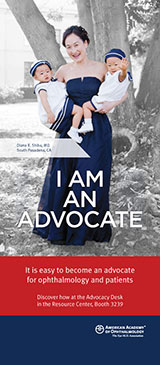 It was 12:30 a.m. I was sitting at a desk in the main clinic, feeling worn already from a busy night on-call as a third-year resident. I remember scribbling a progress note on the last patient I had seen, dying to change out of my sweatshirt and scrubs, jump into the shower and then into bed.
It was 12:30 a.m. I was sitting at a desk in the main clinic, feeling worn already from a busy night on-call as a third-year resident. I remember scribbling a progress note on the last patient I had seen, dying to change out of my sweatshirt and scrubs, jump into the shower and then into bed.
That's when I got a call from a small hospital located 100 miles away, near the U.S.-Mexico border. The ER physician told me he had a four year-old patient. He wasn't sure if the boy had a ruptured globe. He wanted an ophthalmologist to take a look, but couldn't find a local ophthalmologist to see him. The boy had Medicaid.
At around 3:30 am, I got a call from our own university ER that the ambulance from the border hospital had arrived. I was told the boy would be over shortly, but needed to finish a workup in the ER first.
About two hours later, I met the sleepy four year-old and his family. The mother, father and sister looked exhausted. Thankfully the boy did not have a ruptured globe, but just a conjunctival abrasion. The last thing I wanted to do was send this poor family for another wait at the pharmacy, so I just forwarded a tube of erythromycin ointment to Mom and told her to use it twice a day for about a week. I reassured her that her son would be fine.
And that's when the family told me they didn't have a way to get back home! I knew our ER would give taxi vouchers, but would they give one to cover a 100-mile trip? I called and spoke to a few supervisors, and was able to get the family back into a cab and speeding safely toward home.
This is the story I told my U.S. senator. If Medicaid reimbursed physicians at a fair rate, the boy would have had better access to care. I looked her in the eye and told her that as a young ophthalmologist, just a few years out of training, fair reimbursement to physicians is not about making money – and it's far from becoming rich. It's a matter of survival. I told her about the $200,000-$300,000 debts that friends of mine owed in school loans, and how such debt had forced them to consider certain fields in medicine over others when choosing a specialty. They had to consider how to pay off that debt, while also thinking about things that other Americans do – such as buying a house, sending kids to college, etc. I told her about how many California doctors actually lose money when accepting a Medicaid patient, especially given the cost of overhead in large cities. I told her there are still MDs taking Medicaid patients – because it's the right thing to do – but it's hurting their practices. And sadly, this is why many practices have been forced to close their doors to Medicaid patients.
I then asked the senator to look at the scenario I gave from just a purely financial point of view. We had a family of four who was seen in two emergency rooms, traveled in an ambulance 100 miles, and then took a taxi back home. This included emergency room and hospital fees, physician and staff fees, ambulances and taxis, and other resources – all at a cost to the state. And this could have been avoided with increased access to a local ophthalmologist. The math would show that increasing Medicaid rates would still be a savings when compared to the money spent in the example above.
I was told by our state medical association's lobbyist that the senator later used this story on the Senate floor to support continued fair reimbursement for physicians.
I became an advocate for our great field of ophthalmology and medicine as a whole because I felt it was the right thing to do. Not only did I have the time and the ability to do so, but I also had (and still have) the passion to stand up for what I feel is right.
It is a true privilege to do what we do every day, and we need to do everything we can to promote and protect our profession and our patients. Advocacy is a responsibility. We physicians need to be at the table, and need to be heard. One voice can make such a difference, but there is power in numbers. We need you! Join the esprit de corps and be a voice for your practice, your friends and your loved ones. We can and do make a difference!
Diana R. Shiba, MD, is an ophthalmologist in North Los Angeles, Calif.